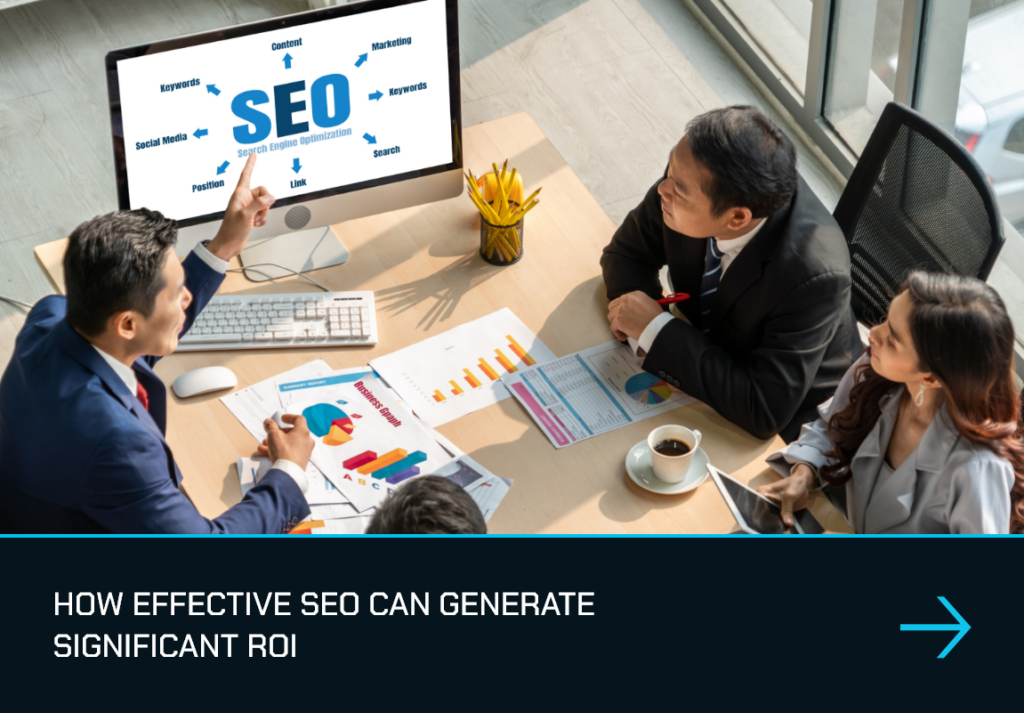Search engine optimisation (SEO) is the practice of optimising your website to increase its visibility when people use search engines such as Bing, Google, and Yahoo to look for products or services related to your business. Unlike paid search advertisements, you cannot pay search engines to make your website appear higher in organic search results, which means SEO experts must invest the time and effort necessary to see results.
How does SEO work?
Search engines rely on crawlers to collect data on all the material they can find on the internet. The content of those pages, combined with the context provided by the links the crawler followed, helps it understand what each page is about and how it is semantically connected to the other pages in the search engine’s broad database.
Following a search query entered into a search box, the search engine employs intricate algorithms to provide what it deems to be the most accurate and relevant list of results for that particular search query. The information they gather helps them deliver more relevant results to consumers looking for specific topics or keywords. Furthermore, search engine spiders analyse websites for easy navigation and reading, awarding user-friendly websites with higher positions on the search engine results page (SERP).

Why is SEO important?
As previously stated, organic SEO results cannot be purchased. Therefore, it is important since it ensures the fairness of search results. Users trust search engines, and appearing at the top of search engine results signals to search engines that your website is a legitimate source. The higher up on search engine results pages your site appears, the more clicks and visitors it will generate.
As a result, businesses may leverage their content as a sales funnel, guiding these consumers toward making a purchase. Moreover, you can establish yourself as an industry leader and keep potential consumers coming back for more with high-quality, SEO-friendly, and user-centric content.
How effective SEO can generate income
Earning money through SEO is a fantastic method to supplement your income or make a living online. To boost your SEO return on investment, one approach is to expand the number of touchpoints at a lower cost instead of paying per click for an advertisement. Customer touchpoints are the points of contact between your brand and its customers, from the beginning to the end of the customer journey.
People will notice you more if you appear more frequently in normal search results. The more familiar you become, the more likely they will turn into customers and acquire your products and services.
The cost of investing in SEO
We mentioned earlier that you could not purchase the actual search engine results. However, there is a cost to acquiring SEO professional SEO services. Furthermore, depending on how you want to get started, SEO investment expenditures may involve hiring an SEO firm, an internal SEO team, content writers, or investing in SEO tools.
Since SEO is a long-term investment, the worth of your website grows as time goes on. In contrast, if your SEO strategy is not well-established or your material is of poor quality, a longer time frame will be of little use. If your website requires considerable technical SEO work or link building, the dollars you invest now may not begin to yield revenue for several months, if not a year.
What SEO experts do
A search engine optimisation professional optimises a website’s pages to ensure relevant search results and a positive user experience, hence increasing website traffic, lead volume, and brand visibility, among other things. Among their responsibilities is the development of optimisation techniques that will improve the search engine results ranks of the company’s website.
To obtain the greatest possible return on investment, these professionals also conduct tests, gather and evaluate data and outcomes, and uncover trends and insights.
The return on investment in SEO
For most organisations, calculating the return on investment for paid search advertisements is simple. Still, organic SEO ROI does not need to be quantified down to the last cent to determine whether or not it is worth it.
Overall, SEO generates a higher return on investment than other forms of digital marketing. This is because not only can SEO help you expand your visibility and reach online, but it can also help you increase your sales by bringing more visitors to your site, providing you with more possibilities to convert leads into customers.
SEO also gives you more opportunities to convert leads into customers. Moreover, there are several important indicators of SEO’s return on investment, including its low cost, long-term nature and improvement over time. This implies that your initial investment will be beneficial in the long run.
Efficient SEO strategies
That being said, let us go over the most effective SEO strategies that will help you grow your business more.
- Master content optimisation
Content optimisation is the process of making modifications to your material’s copy, structure, and metadata to send secure signals to search engines that your content is useful. You can also master this technique by including primary and secondary keywords at the ideal densities and applying the appropriate word count.
- Use the right keywords
In search engines, these are words and phrases that users type into search boxes, often referred to as “search queries.” Furthermore, the most appropriate terms for your SEO strategy will take into consideration relevancy, authority, and the number of searches.
- Publish high-quality content
High-quality content is essential for attracting the right visitors to your website and keeping them engaged while they are there. It is more likely for users to share content with their friends and colleagues if the content is valuable in some way to them.

